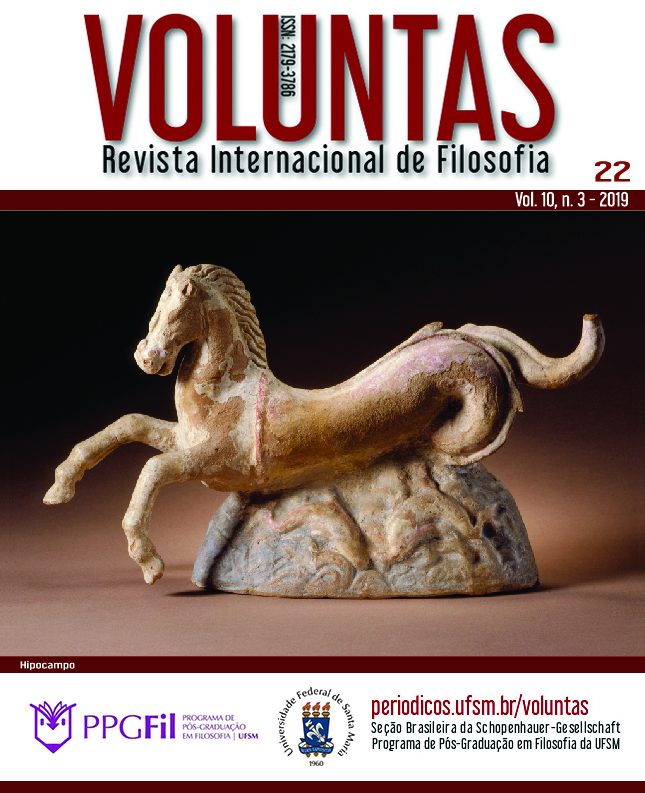Quackery as an aesthetic-philosophical problem in Schopenhauer
DOI:
https://doi.org/10.5902/2179378639684Palabras clave:
Style, Communication, Pedantry, ObscurityResumen
The purpose of this paper is to present the philosophical questions that revolve around the ordinary Schopenhauerian accusation of quackery against his opponents. The study of these satellite-questions shows that quackery can be understood as a philosophical problem and not merely an offense empty of theoretical relevance, as commonly understood. They can be summarized as aesthetic or rhetorical questions, because they problematize the style of the philosophical text, its use and its communicative function. Close to the pedant and the sophist, the charlatan is one who abuses obscurity because of his distancing from concreteness by an option for abstract writing.Descargas
Citas
DIDEROT, Denis. Charlatannerie. In: DIDEROT, Denis & D’ALEMBERT, Jean le Rond. Encyclopédie ou dictionnaire raisonné des sciences, des arts et des métiers. Vol. 3. Paris: Briasson, David, Le Breton & Durand, 1751-1772.
GOETHE, Johann Wolfgang von. Faust. Trad. G. Nerval. Paris: Librio, 1995.
GRACIÁN, Baltasar. El Criticón. Tomo Tercero. Philadelphia: University of Pennsylvania Press, 1940.
HEIDEGGER, Martin. Nietzsche I. Trad. Marco Antonio Casanova. Rio de Janeiro: Forense universitária, 2010.
KIVISTÖ, Sari. The vices of learning: morality and knowledge at early modern universities, Leiden / Boston, Brill, 2014.
PHILONENKO, Alexis. Schopenhauer, une philosophie de la tragédie. Paris: Vrin, 1999.
RAMOS, Flamarion Caldeira. A “miragem” do absoluto: sobre a contraposição de Schopenhauer a Hegel. Crítica, especulação e filosofia da religião. Tese de doutorado. São Paulo: USP, 2008, 252 p.
ROOS, Richard. Introduction. In: SCHOPENHAUER, A. Le monde comme volonté et représentation. Paris: P.U.F., 2009, pp. xi-xxii.
ROSSET, Clément. Schopenhauer, philosophie de l’absurde. Paris: PUF, 1994.
SCHOPENHAUER, Arthur. O mundo como vontade e como representação. Trad. Jair Barboza. São Paulo: UNESP, 2005.
SCHOPENHAUER, Arthur. Crítica da filosofia kantiana. In: O mundo como Vontade e como representação. Trad. Jair Barboza. São Paulo: UNESP, 2005.
SCHOPENHAUER, Arthur. Suppléments. In: Le monde comme volonté et représentation. Trad. A. Burdeau. Paris: P.U.F., 2009.
SCHOPENHAUER, Arthur. Parerga et Paralipomena. Trad. J-P. Jackson. Paris: CODA, 2010.
SCHOPENHAUER, Arthur. Die Beiden Grundprobleme der Ethik. In: Sämtliche Werke, Mannheim: F. A. Brockhaus, 1988, t. 4.
UCCIANI, Louis. Comment Heidegger évince Schopenhauer. In: Philosophique, 9, 2006, pp. 89-102.
Publicado
Cómo citar
Número
Sección
Licencia
La sumisión de los originales para este periódico implica la transferencia, por parte de autores, de los derechos de publicación impresa y digital. Los derechos autorales para los artículos publicados son del autor, con derechos del periódico sobre la primera publicación. Los autores sólo podrán utilizar los mismos resultados en otras publicaciones indicando claramente este periódico como el medio de publicación original. En virtud de ser un periódico de acceso abierto, está permitido el uso gratuito de los artículos en aplicaciones educacionales, científicas, no comerciales, desde que referenciada la fuente (por favor, vea la licencia Creative Commons en el pie de página de este periódico).






